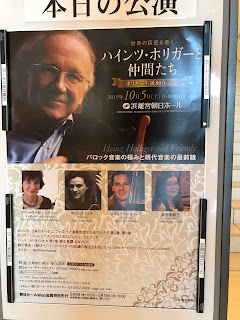Heinz Holliger and Friends at Hamarikyu Asahi Hall, October 5th 2019
I’ve been aware of the difficulties of playing the oboe since I was a child. My cousin plays it and both him and his brother learned to play instruments at a very young age. They were both part of what is now known as El Sistema, a music education program comprised of several orchestras and conservatories. It was founded in 1975 by Jose Antonio Abreu with the goal of providing the youth, in some cases the ones that are more in risk of following through the cracks of the society structure, with a purpose and discipline that will shape their adult lives. Despite the controversies and the compromises with the authoritarian fascist regime of the country, he succeeded. Regarding the latter, it’s possible that Abreu viewed it as the ultimate sacrifice. I’m sure he knew who he was dealing with but thought that partnership was the only way the the program could continue, similar to what Furtwängler thought about his approach in the thirties to help the Berlin Philharmonic survive.
Speaking of the Berlin Philharmonic, one of the feature players in tonight’s concert was, at 17, its youngest member ever and the first from Latin America. The double bass player Edicson Ruiz, along with Gustavo Dudamel and many others, is one of the success stories of El Sistema. He played an extremely difficult piece by the composer being honored this evening with the energy and bravado that reminded me of the music environment in Venezuela in the nineties. You see, I was never officially part of El Sistema, but I did take percussion lessons in the classrooms that were next to the underground parking lot of the Teresa Carreño Concert Hall, I hung out with my cousins a lot too. Ruiz’s energy reminded me of the atmosphere of that era, with musicians rehearsing with their instruments all over the aforementioned cultural complex. Ruiz’s commitment to the music, being the challenges of a contemporary piece or the basso continuo of the Baroque ones, is relentless and it translates through his energy on stage.
I think he’d agree that his story is proof of the accuracy of Abreu's vision. The Preludio e Fuga he performed tonight was dedicated to him by one of the most important composers of the 20th and 21st Centuries: Heinz Holliger. The Swiss musician also got many works written for him by names like Berio, Carter, Messiaen, Stockhausen and Penderecki, among others. Of course he himself is a laureate composer, a conductor and quite possibly one of the best oboists of all time. This evening was a celebration of his 80th birthday and outstanding career.
We also got to hear another of his compositions, Klaus-Ur, which replaced the originally scheduled Matthewmatics. This one was for bassoon solo. Diego Chenna was able to deliver its frantic and dense content reading from a rolled scored supported by six stands. Both this one and Preludio e Fuga explored the limits of the soloists’ instruments range and the ability of the performers to produce those sounds. Both were successfully rendered and captivating.
In contrast the rest of the program was focused on two composers from the Baroque period, an unsung one and the best known composer of that era. At the end of the first half the ensemble of musicians that also included Marie-Lise Schüpbach in second oboe and English horn and Akiko Kuwagata on harpsichord, performed the Trio Sonata for Organ No.1 by Johann Sebastian Bach in an arrangement suitable for this particular ensemble along with two pieces by the Czech composer Jan Dismas Zelenka.
Twenty years ago Heinz Holliger recorded Zelenka’s Trio sonatas for the ECM label, helping sparking interest in a composer unjustly forgotten for centuries until his fellow countryman Bedřich Smetana rediscovered him back in the late Nineteenth Century. He was contemporary with Bach, who took over his duties as the Dresden’s court composer in 1730. He wrote mostly sacred music, but his secular instrumental works are also highly regarded. The aforementioned ECM recording of all six of his trio sonatas is a revelation and we were fortunate to witness number one and number five performed this evening as opener and closer respectively.
The twists and turns, the joys and unusual dynamics of these pieces were highlighted by the presence of Holliger on stage. His energy and strength are definitely rare in a man entering his eight decade. I’m not lying when I say that, in combination with the amazing group of musicians that joined him on stage and in spite of the oboe’s inherent hurdles, his fluidity, and the clarity of his sound filled the entire hall. We were in the presence of music royalty with Mr. Holliger taking care of business up there. The cameras of NHK were there to capture the moment. Can’t wait to see it.
Thank you for reading. Please follow me on Twitter for updates at @ConcertTokyo. You can also click the Like button and get notifications at The Tokyo Concert Experience on Facebook.




Comments
Post a Comment